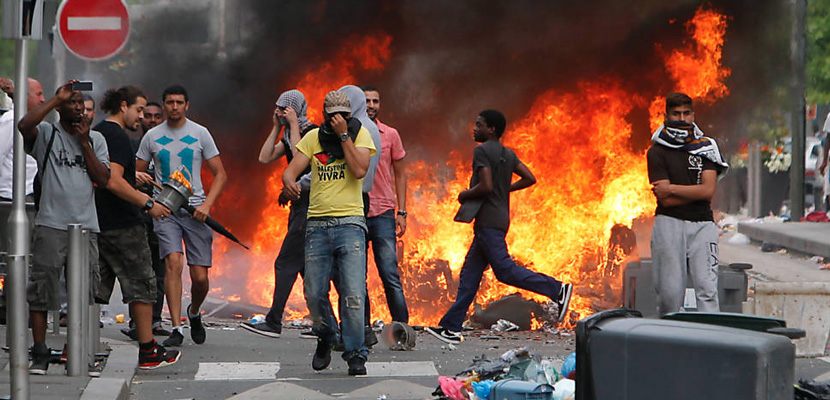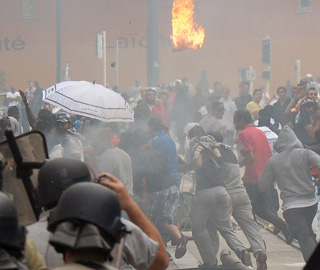A recent survey conducted by a British firm, ICM Research, and published on August 14 by the Russian press agency Rossiya Segodnia, tested European opinion toward the jihadist Sunni organization now known as Islamic State (IS). Reassuringly, the poll showed solid majorities in France, Germany, and the UK opposed to IS and what it stands for. Presumably, this would have satisfied Rossiya Segodnya’s primary interest in the exercise, since IS is a foe both of the Assad regime in Syria (a Russian ally) and of Iran (a Russian partner).
But what did the survey reveal about the minority of Europeans who are favorably disposed to IS? That is the more interesting terrain. In Britain, the figure for those holding “positive” views of IS stood at a moderately low but still disquieting 7 percent, which included the 2 percent whose views were “very positive.” In Germany, the comparable figures were significantly lower: 2 percent and zero percent. But in France, by contrast to both countries, they rose to an impressive 16 percent and 3 percent. Buried in the survey report, moreover, was an even more unsettling contrast: of those under the age of twenty-four, fully 27 percent in France declared themselves supporters or admirers of IS, versus only 4 percent and 3 percent in the UK and Germany.
ICM Research is a highly respected pollster, and its findings—which strikingly confirm Robert Wistrich’s sober analysis of the French situation in his Mosaic essay, “Summer in Paris”—cannot be easily dismissed. Indeed, for the past many weeks they have formed the subject of ongoing discussion among French political scientists and others.
One explanation is demographic: support for IS seems to correlate with the relative size of a country’s Muslim population, and there are twice as many Muslims in France as in either Britain or Germany. Percentage-wise, according to a 2011 Pew Report on the Future of the Global Muslim Population, Muslims account for 4.6 percent of the British population, 5 percent of the German, and 7.5 percent of the French—but French statistics are known to be inaccurate when it comes to reporting ethnicity and religion. Last year, the Ministry of the Interior and the National Institute for Demographic Studies settled on a higher figure for the proportion of Muslims in the country: 9 percent, or almost twice the proportion in the UK and Germany.
And those are just the overall figures. In younger cohorts, thanks to greater fertility or the inflow of immigrants, the proportion of Muslims in all three countries is higher than any of these figures suggest, and very much higher in France. Fully a fifth of French citizens or residents under twenty-four are thought to be Muslims, and in some places the numbers are much greater than that. Thus, 30 percent of the overall population in the département (county) of Seine Saint-Denis in the northern suburbs of Paris is estimated to be Muslim, and in some of its towns the figure reaches or exceeds 50 percent.
French Muslims, and especially young French Muslims, may support IS just as they support Palestinian extremists like Hamas: out of ethnic pride and/or in order to assert themselves within French society at large. As Wistrich points out, a striking feature of this past summer’s pro-Hamas demonstrations in Paris and other French locales was the display of flags. Alongside that of the Palestinian Authority, there were the green Hamas flag, the black IS flag, and the national flags of Morocco, Algeria, Tunisia, Mauritania, and Turkey: the countries from which most first-, second-, or third-generation Muslim immigrants derive.
Since the summer, support for radical Islamic organizations has hardly slackened. On September 24, Hervé Gourdel, a fifty-five-year-old French hiker, was abducted and beheaded in Algeria by a North African offshoot of IS known as Jund al-Khalifa (the “caliph’s army”). The outrage in France was enormous, with backing for French military intervention against IS soaring to almost 70 percent. In the Muslim community, too, a few leaders, including Dalil Boubakeur, the rector of Paris’s Great Mosque, and Hassan Chalghoumi, the head of the progressive Conference of French Imams, denounced jihadist barbarity and attempted to stage “patriotic Muslim” public demonstrations. But these, in marked contrast with the summer’s pro-Hamas rallies, failed to attract more than a few hundred participants, and were bluntly condemned by other Muslim leaders and intellectuals as an unseemly form of “apologetics.”
Still and all, the public-opinion findings of ICM Research cannot be explained solely on the basis of demographic pressure. Even if most French supporters of IS are Muslim, and even if most French Muslims support IS, many other supporters are to be found outside the Muslim community. A deeper political explanation is needed.
And here Robert Wistrich is right to point to the much wider crisis that Europe in general is undergoing and to its ironic byproduct: the cross-breeding of far-left with far-right and Islamic ideas and ideologies, including anti-Semitism. Indeed, one wonders whether it still makes sense to speak of the age-old divide in Europe between left and right, between liberal and conservative. For France, at least, according to the geographer Christophe Guilluy, the answer is, flatly, that it makes no sense at all.
Guilluy became an instant celebrity in 2010 with his claim in Fractures françaises (“French Ruptures”) that the nation is now split between a wealthy and thriving but smaller “Elite France” that lives and works in the gentrified big cities and a “Peripheral France” that comprises “60 percent of the French population and 80 percent of the working class” and is relegated to the outer suburbs and the post-agricultural countryside.
Elite France, in Guilluy’s telling, is well adjusted to globalization—in fact, it is one of globalization’s big winners; Peripheral France sees globalization as its downfall. Elite France is in love with the free market, multiculturalism, and the European Union; Peripheral France wants to get back to a semi-statist economy, the welfare state, and the nation-state. Elite France supports either the classic conservative parties or François Hollande’s mainstream Socialists; Peripheral France is increasingly turning to Marine Le Pen’s National Front or to the far-left sects from the Trotskyites to the neo-Communists, from the Greens to the left wing of the Socialist party.
Unsurprisingly, globalization is frequently associated in France with the United States, the West—and the Jews. By the same token, many of the groups that oppose globalization also oppose the U.S., the West, and the Jews, and tend to see any anti-American or anti-Western or anti-Jewish initiative as a positive development. Whereas French Muslims may support IS or Hamas as expressions of Muslim power, many non-Muslim French may support these organizations as allies in a global anti-American and anti-Western insurrection—a “global intifada,” as they sometimes like to call it.
In today’s cross-breeding mode of politics, this attitude holds both on the far left and among many subgroups within the far right. For the time being, Marine Le Pen’s National Front would seem to be the main beneficiary of the disillusionment of Peripheral France with President François Hollande (elected in 2012 as its champion, only to devote himself willy-nilly to the care and maintenance of Elite France). But last summer, as both the Gaza war and the IS war in Syria and Iraq unfolded, Le Pen’s party was rocked by a bitter feud between its primarily anti-Muslim electoral base and a radical pro-Muslim minority. So far, the party leadership has placed greater emphasis on the anti-Muslim line.
If France has become more thoroughly polarized than Britain and Germany, the reason may lie in its governmental arrangements. Those two countries enjoy both functional constitutions (“unwritten” in the British case) and functional parliaments, the latter of which, especially, allow for debates to take place, for strong personalities to emerge, and for straightforward policies to be enacted. Britain was rejuvenated by Margaret Thatcher in the 1980s, was kept going by Tony Blair, and is now efficiently led by David Cameron. Germany, reshaped by Gerhard Schröder in the early 2000s, is now well managed by Angela Merkel.
Things are very different in France, where Charles de Gaulle’s constitution for the Fifth Republic, for all its alleged perfections, has in practice substituted a state bureaucracy for normal democratic institutions. For decades, most French leaders have pathetically postponed much-needed reforms on the mistaken assumption (to borrow Guilluy’s terminology once more) that the growth of Elite France would forever compensate for the squalor of Peripheral France. In similar fashion, they have been notably unwilling to address issues related to the growth of radical Islam, issues that powerfully affect France both at home and abroad.
There are some exceptions, to be sure. One of them, cited by Wistrich, is Manuel Valls, the current Socialist prime minister. On September 18, Valls visited Paris’s Great Synagogue to deliver Rosh Hashanah greetings. Speaking from the pulpit, he not only acknowledged the increase of anti-Semitic violence in France—up by over 90 percent just in the past year!—but declared that “denying Israel’s right to exist and questioning its future” was “a first step toward anti-Semitism.” He went on to say that the involvement of about a thousand French citizens or residents of France in jihadist activities in the Middle East, and the prospect that many of them would eventually return to France, constituted “a major threat” to the nation’s security—“much more so than any similar challenge in the past.”
Mind you: unlike most other prime ministers, presidents, or government officials in recent French history, Valls is not a product of the state bureaucracy and never belonged to it.
More about: Anti-Semitism, European Jewry, France, Islamism









